|
|
|
Sort Order |
|
|
|
Items / Page
|
|
|
|
|
|
|
| Srl | Item |
| 1 |
ID:
087030
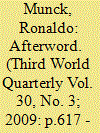

|
|
|
|
|
| Publication |
2009.
|
| Summary/Abstract |
The 'new' international labour studies set out some 30 years ago to define a new object of study and a new trans-disciplinary methodological approach. How does that project translate into present day concerns with globalisation and labour? The achievements and limitations of this paradigm are surveyed here, taking up many of the insights of this collection and charting some options for the future. I would argue that current attention to gender issues does not seem to be matched by a focus on 'race'/ethnicity divisions between workers and the increasing impact these might well have. More broadly migration studies should, arguably, be more closely integrated into the new international labour studies. In methodological terms we need to shift from the structuralism of the 1970s to a post-structuralism that will allow us to critically deconstruct mainstream approaches to labour and development.
|
|
|
|
|
|
|
|
|
|
|
|
|
|
|
|
| 2 |
ID:
087022


|
|
|
|
|
| Publication |
2009.
|
| Summary/Abstract |
China's new labour law is a significant reform that offers workers greater employment security and income protection. It is a product of both unprecedented industrial unrest as well as the Chinese government's decision to move its economy to a higher-wage, higher-technology future. The law has energised many workers, who are now using the courts and the Communist Party-controlled trade unions to press their claims. But the law has also evoked a sharp reaction from many employers, who have sought to circumvent its purposes in two ways. First, they coerce many employees to resign their posts-thereby forfeiting important seniority claims-and then rehire them as new employees. Second, many labour-intensive manufacturers have begun to shutter their factories and shift production to even lower-wage regions of China or Southeast Asia. Although long an instrument of labour control and intimidation, the All-China Federation of Trade Unions has sought to use the new labour law to win for itself a measure of institutional and ideological legitimacy.
|
|
|
|
|
|
|
|
|
|
|
|
|
|
|
|
| 3 |
ID:
087024


|
|
|
|
|
| Publication |
2009.
|
| Summary/Abstract |
The globalisation of food and agriculture over the past three decades has entailed the emergence of fresh fruit and vegetable production in new global regions, and the concentration and centralisation of retailer capital and its augmented power vis- -vis suppliers. Much contemporary literature often assumes (or asserts) that globalisation reduces states' and labour's capacity to bargain with and win concessions from increasingly mobile capital. It is therefore important for empirical studies to investigate the nature of state-capital-labour relations under contemporary globalisation. This article does so by focusing on the emergence, expansion and integration into global retail chains of the S o Francisco valley grape branch in northeast Brazil. It investigates the following interconnected processes: the state's role in facilitating and promoting the emergence of the grape branch and in regulating the new labour force; the changing nature of the labour process and workers' bargaining power; and firm strategies of recruiting and retaining workers.
|
|
|
|
|
|
|
|
|
|
|
|
|
|
|
|
| 4 |
ID:
087023


|
|
|
|
|
| Publication |
2009.
|
| Summary/Abstract |
This article examines the social construction of migrant labour forces through an analysis of the exterior and interior conditioning in an agricultural contract labour programme between Mexico and Canada. I argue that forms of exterior conditioning, especially employers' point-of-production control, establishes the context within which migrant workers' experience unfolds, for which reason it contributes to their 'interior conditioning'. But I argue as well that the result is shaped by workers' employment of a 'dual frame of reference' through which they gauge Canadian wages and working conditions the only way they can, which is in relationship to Mexican ones. Given that neoliberal policies have reduced the options available in Mexico, and diminished the attractiveness of those that remain, contract labour in Canada presents one of the few opportunities many poor, rural Mexicans have to acquire the income necessary for a minimally dignified life. Consequently most workers in this programme do everything possible to please their employers and continue in the programme.
|
|
|
|
|
|
|
|
|
|
|
|
|
|
|
|
| 5 |
ID:
087021
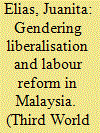

|
|
|
|
|
| Publication |
2009.
|
| Summary/Abstract |
This paper seeks to examine how and why gender needs to be brought into the analysis of state developmentalism in Asia. In doing so, the paper focuses on ongoing processes of labour market and industrial relations reform that have accompanied Malaysia's economic development since the early 1970s. Understanding these reforms from a gender perspective means that we must recognise both the significant contribution that women make to the growth of export manufacturing industries and the role that social relations of reproduction play in underpinning economic reform and transformation. The analysis explores how gendered social relations (of production and reproduction) have been central to the labour politics of Malaysia's state-led developmentalism and how ideas of maintaining 'competitiveness' through the attempts to transition to a more knowledge-centred economy have entailed particular roles and responsibilities for women. Attempts to maintain economic competitiveness in Malaysia have rested upon ideas concerning the need to integrate women more fully into the formal labour market and a greater recognition of the contribution of social relations of reproduction to capitalist accumulation. The article discusses some of the tensions and contradictions that have emanated from this policy shift.
|
|
|
|
|
|
|
|
|
|
|
|
|
|
|
|
| 6 |
ID:
087029
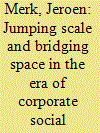

|
|
|
|
|
| Publication |
2009.
|
| Summary/Abstract |
Global outsourcing arrangements in the garment industry, and elsewhere, provide one type of company-brands or retailers-with the possibility of distancing themselves from the organisational questions related to (mass) labour processes. By externalising the labour-intensive aspects of production, global sourcing companies no longer have to take responsibility for the majority of workers involved in the process. This has given these companies an opportunity to break out of unionised and established industrial areas with strict institutionalised labour processes, and has undermined traditional strategies that labour has used to protect itself against exploitation, turning the global supply chain into a barrier to organising and collective bargaining. Spatial strategies are by no means exclusive to firms. Workers too can pursue their causes on a broader socio-geographic terrain, a process often referred to as 'jumping scale' or 'bridging space'. Drawing upon concepts derived from social and labour geography, this paper is a critical inquiry into the nature, possibility and limits to cross-border solidarity campaigns in the global garment industry. The paper starts by emphasising that workers remain active participants in a process of contestation that constantly reshapes the dynamics of workplace control and its accompanying power balances and relations. Then we discuss how the increased attention being paid to working conditions by activists, consumers, journalists and branded corporations adds an extra-local dimension to workplace relations, (potentially) restricting management from exercising more despotic forms of labour relations. The final part discusses how the Clean Clothes Campaign's urgent appeal system provides a grassroots-based system to build labour solidarity across space, which may help to regain leverage over capital.
|
|
|
|
|
|
|
|
|
|
|
|
|
|
|
|
| 7 |
ID:
087028


|
|
|
|
|
| Publication |
2009.
|
| Summary/Abstract |
In 2007 Lesotho's apparel manufacturers took a remarkable step: they voted unanimously to adopt a national 'sweat-free' strategy, promising to protect and strengthen workers' rights in the tiny, landlocked country. This paper seeks first to explain why manufacturers supported the move, in the context of changing market prospects as well as global pressure from multinational brands and international agencies. The paper then asks whether Lesotho offers a shining example or a cautionary tale for developing countries facing similar dilemmas about how to protect citizens' rights at work.
|
|
|
|
|
|
|
|
|
|
|
|
|
|
|
|
| 8 |
ID:
087025
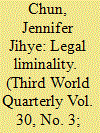

|
|
|
|
|
| Publication |
2009.
|
| Summary/Abstract |
Irregular employment (bij[ocheck]nggyujik) has become the dominant form of employment in South Korea, with upwards of 70% of women employed in this sector. This transformation has not only affected the demographics of the labour market, but it has also fundamentally reshaped how unions can organise workers and build collective power. In particular, irregular workers are faced with a state of legal liminality in which workers are neither fully protected by nor fully denied the rights of formal employment, resulting in classification struggles over the terms and conditions of irregular employment. Drawing from recent cases, this paper discusses the limits of masculinised forms of labour militancy and the prospects for developing more inclusive forms of unionism across gender and employment status. Interrogating how workers and their collective organisations are challenging the 'legal liminality' associated with downgraded forms of irregular employment is crucial for understanding the new dynamics of economic marginality and social exclusion in Korea as well as in the broader global economy.
|
|
|
|
|
|
|
|
|
|
|
|
|
|
|
|
| 9 |
ID:
087027
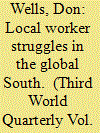

|
|
|
|
|
| Publication |
2009.
|
| Summary/Abstract |
The offshoring of production from the global North to the South has been crucial to the 'race to the bottom' in global labour standards. The corporate social responsibility (CSR) policies of Northern transnational corporations-particularly their 'corporate codes of conduct'-have received much attention for their putative function of limiting this race by regulating labour standards in Southern workplaces. Similar attention has been given to campaigns by Northern anti-sweatshop 'transnational advocacy networks' (TANs) in promoting enforcement of labour standards in the South. However, evidence suggests that these CSR policies have little effect on labour standards enforcement, and that this ineffectiveness is embedded in structural constraints in the global political economy. Case studies of the role of the anti-sweatshop TANs suggests that, while they have provided important support to local worker struggles in the South, that support is less central than has often been understood. Instead, local workers, their organisations and community allies in the South have played more pivotal roles in this 'globalisation from below'.
|
|
|
|
|
|
|
|
|
|
|
|
|
|
|
|
| 10 |
ID:
087019


|
|
|
|
|
| Publication |
2009.
|
| Summary/Abstract |
Textile production by rural households has been a major component of political economies in China since at least the late Empire. The petty commodity production of textiles first developed within a pre-capitalist context, marked by the interaction of owner-operator peasant households with a tributary mode of production. Initially petty commodity production led neither to 'industrialisation' nor to the replacement of pre-capitalist forms of household-based production. Instead, it continued to be carried out by people as members of households to which they had unbreakable economic obligations, and over whom kin seniors could exercise state-sanctioned patriarchal power to operate gender transfers. As cheap imports of machine-spun cotton yarns threatened to undercut China's domestic textile industry in the late 19th century, capitalist investors began to operate factories employing the rural women who were the first proletarians to manufacture textiles outside the household, and the forebears of China's new working class of internal rural migrants.
|
|
|
|
|
|
|
|
|
|
|
|
|
|
|
|
| 11 |
ID:
087026


|
|
|
|
|
| Publication |
2009.
|
| Summary/Abstract |
The repositioning of China as a ' world workshop' rests upon the nurturing of a new Chinese working class. This article focuses on questions of collective action of migrant workers who are now the major force of a new working class that actively strives to alter its fate through labour struggles. By studying the collective actions of migrant workers in the gemstone industry, we examine a process in which workers' resistance has developed from a single means to multiple means, from single-factory to cross-factory participation, from engaging only in legal action to launching varied collective action. Three primary questions are raised: first, what forms of collective labour action have arisen and what are their mechanisms of mobilisation? Second, how do shop-floor industrial relationships, legal systems and other institutional arrangements shape such collective resistance? Third, how do workers nurture class consciousness through their participation in collective action and, most importantly, how do they make sense of their struggle through a radicalisation process?
|
|
|
|
|
|
|
|
|
|
|
|
|
|
|
|
| 12 |
ID:
087018


|
|
|
|
|
| Publication |
2009.
|
| Summary/Abstract |
This introductory article to the special issue surveys the field of international labour studies and examines the key areas of growth over the past decade. It locates three core areas of the new literature: 1) the social construction of new labour forces across an expanding international division of labour; 2) the self-organising potential of workers, particularly within non-traditional sectors; and 3) the possibilities for transborder labour movements to help address the asymmetrical power relationships between globalised capital and localised labour. It argues that international labour studies as a field needs to make explicit its challenge to mainstream political economy by detailing how struggles over the construction, reproduction, utilisation and restructuring of labour forces are the contested social foundations upon which the global economy stands.
|
|
|
|
|
|
|
|
|
|
|
|
|
|
|
|
|
|
|
|
|